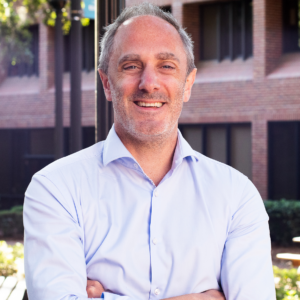Research Spotlight: Nigel Newbutt
Q & A with Nigel Newbutt, Ph.D., Assistant Professor in the School of Teaching and Learning
What basic questions does your research seek to answer?
The basic questions that guide my research are associated with how innovative and novel technologies can support autistic people in their lives. For me, the transformative nature of emerging technologies means that there are many applications for under-served groups, and my work locates this with people with disabilities and autistic groups. I would also add; another basic question I consider core to my work is that of how technologies can be informed and co-designed with the communities I support. This has become so central to my work (and the field), especially if we are to fully realize the potential of a range of technologies for under-served groups. Linked to this, I am also exploring meaningful ways that virtual reality technologies can be applied to vocational skill development in better supporting successful work-based skills and transitions into work environments for autistic people.
What makes your work interesting?
For me, many things. But most importantly, I get to work with a wide range of often under-served groups and people in the community. The interdisciplinary nature of this work is also interesting, and I get to work across disciplines and with different subject areas. In bringing together (and helping to bridge) education, psychology, computing, learning design and digital media means I can draw on a range of disciplines to tackle the urgent and timely research in this field. The insights that the people I work with bring to my research also make for interesting insights, knowledge, and collaborations. A vast range of autistic people (and their networks) kindly offer their time to support this work, and their insights are central to guiding my research. Coupled with others (teachers, parents, caregivers), we build and design research that is of value and importance to them.
Most importantly, my research seeks to send informed and important messages to policymakers, practitioners, and local government. This pathway to impact is often neglected in our field. For far too long, research has sat in journals and research labs with little/no impact on the people we work with. I am addressing this through my work and lab, exploring ways to co-design the future of immersive technologies with autistic groups and their networks. Taking research (and the tools) into the community to seek closer alignment to their priorities, is an aspect of my work that is both interesting and novel.
What are you currently working on?
I am working on three projects that draw together aspects outlined above. First, a project involving the co-design and application of a robot in a special needs school (see image 1). This is working in a school and from a grounded position that places the young autistic people at the core of what the robot will do and where (hint: not in their classrooms).
Second, I am developing lines of enquiry around the safe and ethical use of virtual reality head-mounted displays for autistic groups while working to articulate this into the classroom (see images 2 and 3). This is closely linked to the role of VR in classrooms for autistic youth and their preferences for devices and experiences.
Finally, I am connecting with partners in Jacksonville, FL who educate autistic people, with a view to co-designing and co-develop innovations using VR in their context linked to transitions to employment, further education and independent living.
We are very keen to collaborate and meet others working in this area or cognate fields, so please do reach out and connect @newbutt and/or @EltlHub.






